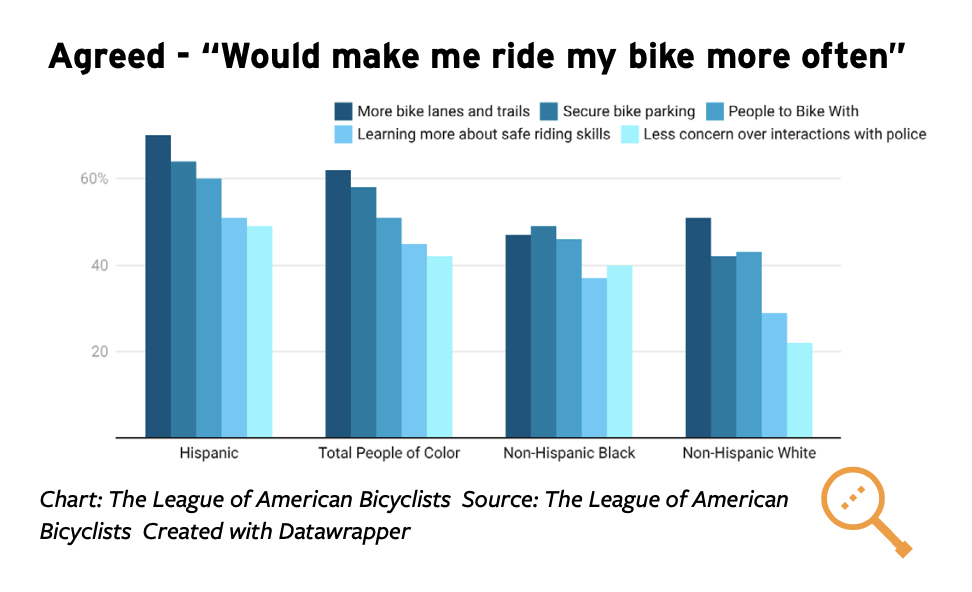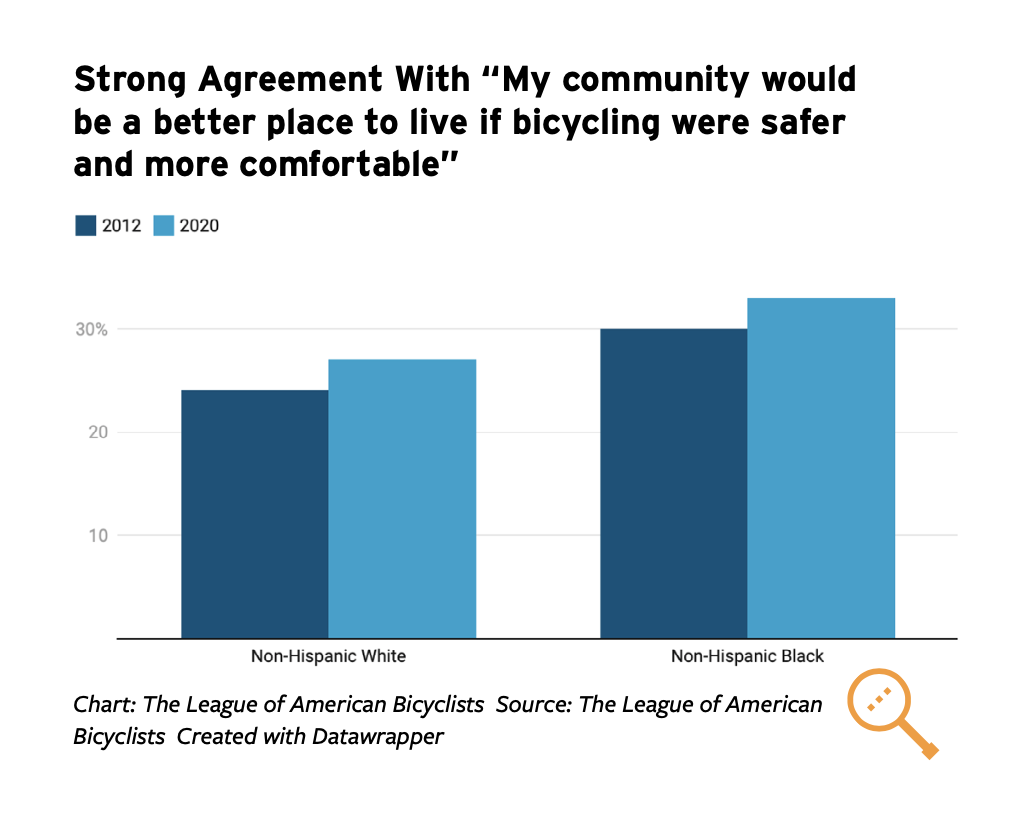Reconnecting To The New Majority
In 2013, the League of American Bicyclists (League) and the Sierra Club published “The New Majority: Pedaling Towards Equity,” a report highlighting the changing demographics within the bicycling movement. Today, the League is releasing a new report, “Reconnecting to the New Majority,” to update our understanding of demographic trends in bicycling, identify areas of focus to ensure that all people — particularly Black people, Indigenous people, and people of color (BIPOC) — have access to safe bicycling, and further progress actions that promote equity in bicycling.
Download the report here »
People of all races, incomes, and ages want safer bicycling — that comes across clearly in the League’s research and data analysis conducted for the report. New and continued investments are critical to making bicycling safe, comfortable, and accessible to all, particularly in BIPOC communities where underinvestment has inhibited the development of a transportation system that serves all people. As identified in the report, investments that would address inequities start with a Safe System approach to the built environment, improved bike parking, increasing opportunities for people to bike with others and to receive hands-on bicycling education, and reducing interactions between bicyclists and the police.

“In ‘Reconnecting to the New Majority’, we see that so many of the societal and systemic issues identified in 2013 continue to exist today, both broadly and within the bicycling community,” said Bill Nesper, executive director of the League of American Bicyclists. “We know that our communities are stronger and safer and our neighbors are healthier and happier when more people ride bikes, and to ensure more people can choose to bike, we must address the issues of equity, diversity, and inclusion in the bicycling community. We hope this report illuminates where we’ve been and how we can keep making progress.”
In “Reconnecting to the New Majority,” the League looks at new data about demographic trends in bicycling, and analyzes findings from a survey conducted in 2020 with the help of a focus group. The League worked with Charles T. Brown of Equitable Cities to convene the focus group in 2021 around the survey results and League equity efforts. Respondents in the survey and participants in the focus group highlighted the need for safe, equitable bike infrastructure, including easily accessible and secure bike parking, planned with community participation; diverse and representative people and groups to ride with and receive bicycling education through; and reducing interactions with the police.
Other select findings in the report include:
- Demographic shifts in who bikes, including an increase in Latinx and Hispanic ridership and a decline in the number of Black people bicycling.
- We have seen significant increases in bicyclist deaths due to drivers of motor vehicles between 2013 and 2019 — and as documented in 2013, the people who are experiencing traffic violence continue to be disproportionately people of color.
- People across all demographic groups believe their community would be a better place to live if bicycling were safer and more comfortable and people
- People in most demographic groups believe better bicycling infrastructure, like bike lanes and trails, will lead to them biking more often but bike lanes and trails alone are not enough to encourage all people to bike more often.
- Secure bike parking is highly valued — most demographic groups identified it as the second more important intervention for better biking.
- People indicated that more opportunities to bike with others would increase their participation in bicycling, and it’s important for those groups to be representative, diverse, and appropriate for people with different ability levels.
- People are more likely to bike more often if they can access and attend a skill-building bicycling education class, which is best led through a diverse and representative network of educators.
- Potential interactions with police were identified as a deterrent to participating in more bicycling by Black, Hispanic, and younger populations at a significantly higher rate than by older and white populations.
“Reconnecting to the New Majority” offers bike advocates and the bicycling community at large, who are majority white, an assessment of the data on racial and ethnic trends in bicycling. It also offers an opportunity for the bicycling community to reflect on our values and our commitments to equity, which make it all the more important to address the challenges and disparities faced by Black and brown people, and other groups that have been economically and socially marginalized.
Equity, diversity, and inclusion are fundamental to the League and the bicycling community successfully building a Bicycle Friendly America for everyone. This means more than simply being open to new ideas, people, and groups. This means actively engaging with, listening to, learning from, and collaborating deeply with others towards our shared goals.
Please join the League for a webinar on the findings in “Reconnecting to the New Majority” on November 9, 2021, at 3pm ET, featuring the report’s lead author Ken McLeod, policy director at the League; focus group leader Charles T. Brown, founder of Equitable Cities; and Amelia Neptune, director of the Bicycle Friendly America program at the League.
“Reconnecting to the New Majority” was produced by the League with funding from the Centers for Disease Control and Prevention as part of its Active People, Healthy Nation initiative.